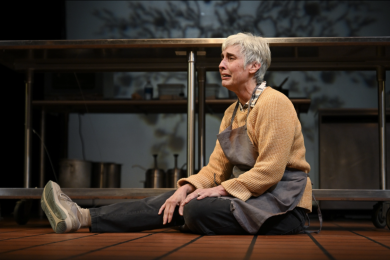5 Stages of Grief
Have you ever seen a Monet in person? Specifically, have you ever seen Small Country Farm at Bordighera (Un coin de ferme à Bordighera) in person? I have, except I didn’t know it was a Monet so I turned to my friend and said something like ‘Ugh! I hate these heavy-handed ones. All that thick oil makes me tired just looking at it. I don’t think the chosen medium does justice to the subject.’ To which my friend replied “…umm… that’s a Monet.” And thus began my 5 stages of grief. 1. Denial: No, it can’t be! I wouldn’t feel that way about a real Monet in person. I’m too cultured for that! 2. Anger: I walked by it too close! The curator messed up, it should have been presented at greater distance. 3. Bargaining: I’m still a smart person, I still get most things right even though I got this one wrong. 4. Depression: I know nothing. My opinion differs from convention so I’m wrong and worthless. 5. Acceptance: Actually, I get to maintain my own opinion about art (that’s the point) and my opinion is just as valid as anyone else’s even if it differs. I didn’t like this piece at first glance and I don’t like it now. I appreciate that other people like it for a multitude of reasons but I do not. I hate to say it, but these 5 stages of grief are exactly how I feel about MN Opera’s production of Rigoletto.
To not mince words: this is a negative review. Not of MN Opera as a whole, their production of Dead Man Walking moved me to tears for the first time in any theatrical production in my entire life. Not of the actors onstage: Marie-Eve Munger presented the role of Gilda (and particularly the aria Caro nome) with superhuman magic, Olafur Sigurdarson was masterful, and the very active chorus was unified and deliberate. But beyond that I think the show is about 90 minutes too long and 90% too vague and I think the entire creative team knows that, yet selected it to be part of their season. I do not offer criticism lightly so please let me specify my thoughts.
1. Yes, Giuseppe Verdi was a master...of musical composition. I would argue that he was not a master of choosing libretti (scripts) that perfectly withstand the test of time. Ignoring the slow pacing of the show, the central plot point of Rigoletto is that the hero’s daughter is kidnapped, raped by her captor (according to the dramaturg’s program notes but not explicitly shown onstage), released, then realizes she is in love with said rapist and chooses to be murdered in order to save his life. Maybe that was a cool plot in 1851 but here and now it feels problematic in so many ways.
In case that weren’t reason enough to dismiss this opera from modern productions, the script feels clumsy again and again. The character of Rigoletto is presumably the hero but we’re never really introduced to him nor given a reason to root for his character. He keeps speaking of taking action but never really does. Eventually he hires a well placed hitman (the one side ‘on the street’ character to whom we’re introduced) to do his dirty work for him. Also, back in 1850 the working title of the opera was “The Curse” and although the title changed, the plot point of the curse remained…kind of…in that it was mentioned so vaguely that it’s more of a liability than an asset.
2. MN Opera’s staging felt unfocused and somewhat random. Various scenes offered assorted ideas of costume and scenery that were all fairly clever on their own (vaguely Nazi-themed bad guys, modern military looking guards, a wall of 70 electrified security cameras, costume pieces made from glow sticks, a monolithic imposing set covered in black plastic) but collectively felt distracting.
As each disparate idea was introduced it pulled me further away from the story, not deeper into it. I don’t know the director of this show and thus can’t comment on the rest of his work but I think conquering the clumsy script was an uphill climb. The plot is slow, vague and has a lot of problems that fall to the director to solve in a variety of ways. This director chose to solve them with these assorted ‘updates’ but didn’t make them consistent to any time or place. Oh, and there’s an on-stage stripper in one scene.
3. There were great musical moments. The aforementioned Caro nome, the ubiquitous La donna è mobile, the final act’s quartet and others. The orchestration is beautiful and every musician in that room presented Verdi’s composition with profound expertise… but I would have rather seen them present something else with profound expertise.
4. Yet despite all this, a full house at the Ordway loved the show. Many gave a standing ovation. I do not belittle their experience, I wish I understood it better. Perhaps there was enough incredible music to give the (in my opinion) sloppy plot a pass. Perhaps the general theme of defying royalty is worthy of a standing ovation. Perhaps the character of Rigoletto demands enough empathy through his discouragement and grasping at justice that he warrants the ovation. Perhaps it’s something I don’t understand, if that’s the case please let me know via that comment box below.
5. Acceptance: The music is beautiful. The Ordway theater is beautiful. MN Opera is worthy of your support. All of those are probably reason enough to see the show while you can (through March 31). But my opinion remains. To each our own.




